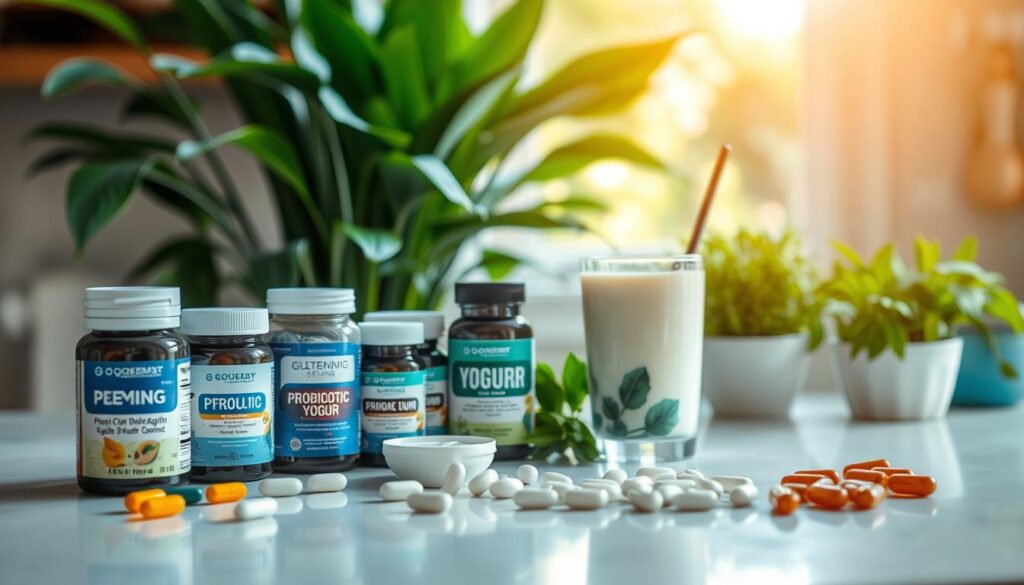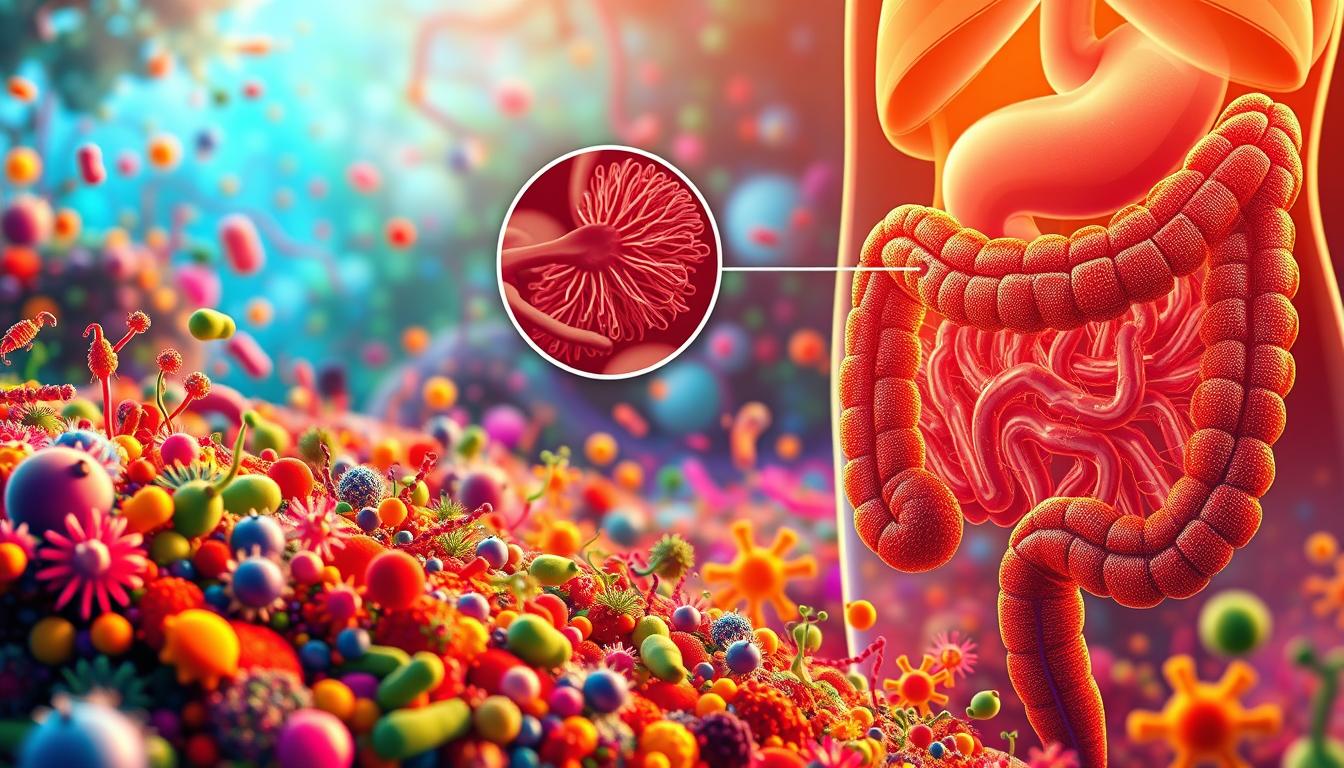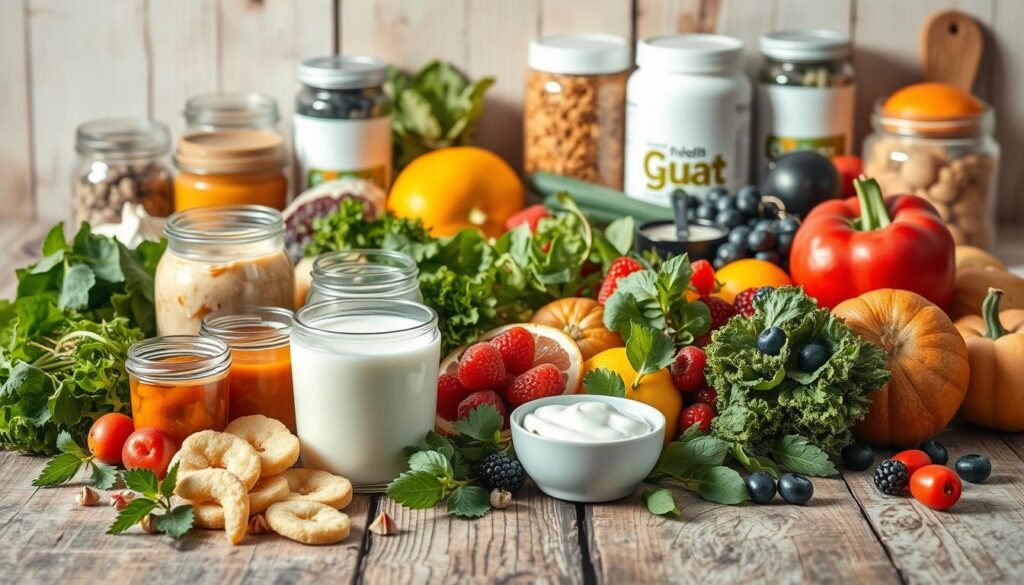Are you aware that your gut health plays a significant role in your overall well-being? The balance of your gut microbiome affects not just your digestive system, but also your immune system and even mental health.
A healthy gut microbiome is crucial for optimal digestion and overall wellness. So, what can you do to enhance your gut microbiome?
Fortunately, there are several natural ways to improve your gut health. By incorporating simple dietary changes and lifestyle modifications, you can promote a balanced gut microbiome.
Key Takeaways
Table of Contents
- Understand the importance of gut health for overall well-being
- Learn simple dietary changes to promote a balanced gut microbiome
- Discover lifestyle modifications that support gut health
- Explore natural ways to enhance your gut microbiome
- Start your journey to optimal digestion and overall wellness
Understanding Your Gut Microbiome and Why It Matters
Your gut microbiome is a hidden world that influences your health in ways you might not expect. It’s a complex ecosystem comprising trillions of microorganisms that live in your digestive tract. These microbes play a crucial role in various bodily functions, from digestion and nutrient absorption to immune system regulation and even mental health.
What Is the Gut Microbiome?
The gut microbiome refers to the vast community of microorganisms residing in your gastrointestinal tract. This community is made up of different species of bacteria, viruses, fungi, and other microorganisms that coexist and interact. A healthy gut microbiome is characterized by a diverse range of microbes, with a balance between beneficial and potentially harmful bacteria.
A diverse gut microbiome is crucial for overall health. It aids in the breakdown of complex foods, synthesizes certain vitamins, and supports the immune system. An imbalance, also known as dysbiosis, can lead to various health issues.
The Connection Between Gut Health and Overall Wellness
The health of your gut microbiome is intricately linked with your overall wellness. Research has shown that there is a significant connection between the gut and other bodily systems, including the immune system, nervous system, and even the skin.
- A healthy gut microbiome supports a strong immune system.
- It influences mental health through the gut-brain axis.
- Gut health is connected to skin health, with imbalances potentially leading to conditions like acne.
Signs of an Unhealthy Gut Microbiome
Recognizing the signs of an unhealthy gut microbiome is the first step towards addressing any potential issues. Symptoms can manifest both physically and mentally.
Physical Symptoms to Watch For
Physical symptoms of an unhealthy gut microbiome can include:
- Bloating and gas
- Abdominal pain or discomfort
- Changes in bowel habits, such as diarrhea or constipation
- Food intolerances
Mental Health Connections
There’s a growing body of evidence suggesting a link between the gut microbiome and mental health. An imbalance in gut bacteria has been associated with:
- Anxiety and depression
- Mood swings
- Difficulty concentrating
Understanding these connections can empower you to take control of your gut health and, by extension, your overall well-being.
How to Improve Gut Microbiome Naturally Through Diet
Your diet is the foundation for a thriving gut microbiome. By making informed food choices, you can significantly enhance your gut health and overall well-being.
Incorporate Probiotic-Rich Foods
Probiotics are live bacteria and yeasts that are beneficial for your gut microbiome. Incorporating probiotic-rich foods into your diet can help maintain a healthy balance of gut bacteria.
Fermented Foods to Add to Your Shopping List
Fermented foods are a rich source of probiotics. Some excellent options include:
- Yogurt (with live cultures)
- Kefir
- Sauerkraut
- Kimchi
- Miso
- Tempeh
These foods can be easily incorporated into your meals to boost your probiotic intake.
How to Introduce Probiotics Without Digestive Discomfort
To avoid digestive discomfort when introducing probiotics, start with small amounts and gradually increase your intake. It’s also helpful to choose products with multiple strains of bacteria.
“The key to benefiting from probiotics is to introduce them into your diet gradually, allowing your gut microbiome to adjust.”
Consume Prebiotic Foods to Feed Good Bacteria
Prebiotics are non-digestible fibers that serve as food for beneficial bacteria in your gut, promoting their growth and activity.
Top Prebiotic Foods and Their Benefits
Some of the top prebiotic foods include:
| Food | Benefits |
|---|---|
| Asparagus | Rich in inulin, supporting the growth of beneficial bacteria. |
| Bananas | High in pectin, which helps feed good bacteria. |
| Onions and Garlic | Contain fructooligosaccharides, promoting a healthy gut microbiome. |
Simple Ways to Include More Prebiotics in Your Meals
You can easily add prebiotics to your diet by including a variety of fruits, vegetables, and whole grains in your meals. For example, adding sliced bananas to your breakfast or sautéing onions and garlic for dinner can make a significant difference.
Increase Dietary Fiber Intake
Dietary fiber is crucial for a healthy gut microbiome. It helps in the digestion of food and promotes the growth of beneficial bacteria.
Increasing your fiber intake can be as simple as eating more fruits, vegetables, and whole grains.
Reduce Sugar and Processed Food Consumption
Consuming high amounts of sugar and processed foods can disrupt your gut microbiome by promoting the growth of harmful bacteria.
Hidden Sources of Gut-Disrupting Ingredients
Be aware of hidden sources of sugar and processed ingredients in foods like packaged snacks, sauces, and even some seemingly healthy foods.
Healthy Swaps for Common Processed Foods
Make healthy swaps by choosing whole foods over processed ones. For example, opt for homemade sauces instead of store-bought, and choose whole grain bread instead of white bread.
By being mindful of your food choices, you can significantly improve your gut health.
Lifestyle Changes That Enhance Gut Microbiota
Improving your gut health isn’t just about what you eat; it’s also about how you live. Adopting certain lifestyle changes can significantly enhance your gut microbiota, leading to overall better health and wellness.
Regular Exercise and Physical Activity
Regular exercise is known to have a positive impact on gut health. Physical activity can enhance the diversity of gut microbiota, which is crucial for a strong immune system and overall health.
Best Types of Exercise for Gut Health
While any form of exercise is beneficial, some types are particularly good for gut health. These include:
- Aerobic exercises like running, cycling, and swimming
- Resistance training to build muscle
- Yoga and Pilates for flexibility and stress reduction
Creating a Gut-Friendly Exercise Routine
To create a gut-friendly exercise routine, consider the following tips:
- Start slowly and gradually increase the intensity and duration of your workouts.
- Mix different types of exercises to keep your routine interesting and prevent plateaus.
- Listen to your body and rest when needed to avoid overtraining.
Manage Stress Levels
High stress levels can negatively impact your gut health. Engaging in stress-reducing activities such as meditation, deep breathing, or yoga can help manage stress.
“Stress is a major contributor to gut health issues. Finding healthy ways to cope with stress is crucial.”
Prioritize Quality Sleep
Quality sleep is essential for overall health, including gut health. Poor sleep can disrupt the balance of gut microbiota.
| Sleep Duration | Impact on Gut Health |
|---|---|
| Less than 5 hours | Significant disruption in gut microbiota |
| 5-7 hours | Moderate impact; some disruption |
| 7-9 hours | Optimal; balanced gut microbiota |
Limit Antibiotic Use When Possible
Antibiotics can be lifesaving, but they can also disrupt gut microbiota. It’s essential to use them judiciously.
How to Support Your Gut During Necessary Antibiotic Treatment
When taking antibiotics, consider the following to support your gut health:
- Consume probiotic-rich foods or supplements
- Eat prebiotic foods to feed good bacteria
- Stay hydrated
Questions to Ask Your Doctor About Antibiotics
When prescribed antibiotics, ask your doctor:
- Are there alternative treatments available?
- How can I minimize the impact on my gut health?
- Can I take probiotics during or after treatment?
By incorporating these lifestyle changes, you can significantly enhance your gut microbiota and overall health.
Supplements and Additional Strategies for Gut Health
In addition to a balanced diet, certain supplements and lifestyle adjustments can significantly support gut microbiome health. While a healthy diet provides the foundation, additional strategies can help optimize the gut microbiome.
Probiotic Supplements: When and How to Use Them
Probiotic supplements can be beneficial for individuals who need extra support for their gut health. These supplements contain live bacteria that can help restore the balance of the gut microbiome.
Choosing the Right Probiotic Strains
Different probiotic strains offer different benefits. For example, Lactobacillus and Bifidobacterium are commonly used strains that can support digestive health and boost the immune system.
When selecting a probiotic supplement, it’s essential to choose a product that contains strains relevant to your specific health needs.
Timing and Dosage Considerations
The timing and dosage of probiotic supplements can impact their effectiveness. Taking probiotics with food can help protect the bacteria from stomach acid, enhancing their survival rate as they reach the intestines.
It’s also crucial to follow the recommended dosage and consult with a healthcare professional, especially if you’re new to probiotic supplements.
Beneficial Herbs and Spices
Certain herbs and spices have been found to have beneficial effects on gut health. For instance, ginger has anti-inflammatory properties that can soothe the digestive tract, while turmeric contains curcumin, which has potent antioxidant properties.
| Herb/Spice | Benefit | Usage |
|---|---|---|
| Ginger | Anti-inflammatory | Tea, cooking |
| Turmeric | Antioxidant | Cooking, supplements |
| Peppermint | Digestive relief | Tea, capsules |
Intermittent Fasting and Gut Health
Intermittent fasting has gained attention for its potential benefits on gut health. By giving the digestive system a break, intermittent fasting can help reset the gut microbiome and improve its diversity.
However, it’s crucial to approach intermittent fasting carefully, especially for individuals with certain health conditions or nutritional deficiencies.
Hydration’s Impact on Your Microbiome
Adequate hydration is essential for maintaining a healthy gut microbiome. Water helps in the digestion and absorption of nutrients, and it supports the mucosal lining of the intestines.

Drinking enough water throughout the day can help prevent constipation and support the overall health of the gut microbiome.
Conclusion: Building a Sustainable Gut Health Routine
Improving your gut microbiome naturally is a journey that requires patience, dedication, and a comprehensive approach. By incorporating the tips and strategies outlined in this article, you can take the first step towards a healthier gut and a happier you.
To improve gut microbiome naturally, focus on making sustainable lifestyle changes, such as adopting a balanced diet rich in probiotics and prebiotics, exercising regularly, managing stress, and prioritizing quality sleep. These gut health tips will help you build a strong foundation for a thriving gut microbiome.
By maintaining a consistent routine and making informed choices, you can enjoy the benefits of a healthy gut microbiome, including enhanced overall well-being and a stronger immune system. Start your journey today and discover the positive impact that a balanced gut can have on your life.
FAQ
What are some natural ways to boost my gut flora?
You can boost your gut flora naturally by incorporating probiotic-rich foods like yogurt, kefir, and fermented vegetables into your diet, consuming prebiotic foods such as asparagus, bananas, and onions, and increasing your dietary fiber intake.
How can I improve my gut microbiome through diet?
Improving your gut microbiome through diet involves eating a balanced diet rich in fruits, vegetables, and whole grains, reducing sugar and processed food consumption, and staying hydrated.
What are some gut-friendly foods I can add to my diet?
Gut-friendly foods include fermented foods like kimchi, sauerkraut, and kefir, as well as prebiotic-rich foods like asparagus, garlic, and onions. You can also consider adding probiotic supplements to your diet after consulting with a healthcare professional.
Can exercise really impact my gut health?
Yes, regular exercise and physical activity can positively impact your gut health by improving the diversity of your gut microbiome and enhancing the overall health of your gut.
How does stress affect my gut microbiome?
Chronic stress can negatively impact your gut microbiome by reducing the diversity of beneficial bacteria and increasing the production of stress hormones, which can lead to digestive issues and other health problems.
Are probiotic supplements necessary for gut health?
Probiotic supplements can be beneficial for gut health, especially for individuals with compromised gut microbiomes or those who have taken antibiotics. However, it’s essential to choose the right probiotic strains and consult with a healthcare professional before adding supplements to your diet.
How can I support my gut health during antibiotic treatment?
To support your gut health during antibiotic treatment, consider taking probiotics or consuming probiotic-rich foods, staying hydrated, and eating a balanced diet. It’s also essential to discuss your treatment plan with your doctor and ask about potential alternatives or additional support.
What role does hydration play in maintaining a healthy gut microbiome?
Adequate hydration is crucial for maintaining a healthy gut microbiome, as it helps to prevent constipation, supports the absorption of nutrients, and maintains the integrity of the gut lining.

